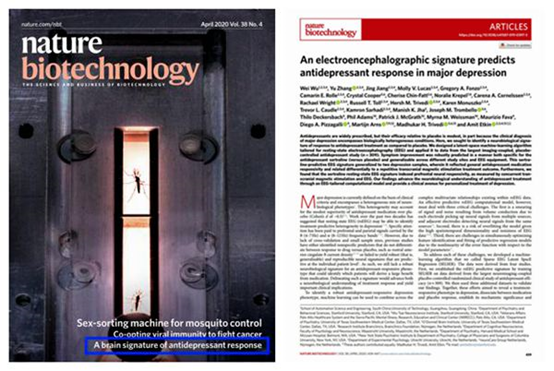
Journal cover & Research paper
Recently, Nature Biotechnology, a top journal in the field of engineering and technology (with the impact factor as high as 35.7), a sub-journal of the world-renowned academic journal called Nature, officially published a research paper titled “An electroencephalographic signature predicts antidepressant response in major depression” in the form of Article. The article takes Wu Wei, a researcher from the School of Automation Science and Engineering of SCUT as the first author, with SCUT as the first unit, and the Stanford University, Harvard Medical School, Columbia University, and UT Southwestern Medical Center as the cooperative research units. It is not only a new breakthrough made by the School of Automation Science and Engineering of SCUT in the development of brain science and technology in recent years, but also a prominent achievement in the interdisciplinary research of artificial intelligence and biomedical information analysis.
The article reported on a neurobiological signature of response to antidepressant treatment, which was validated by multiple sets of independent clinical EEG dataset, and its causal neural mechanism was explored and analyzed by using simultaneous transcranial magnetic stimulation and EEG technology.
Thanks for the low price of the EEG equipment and the simple work of data collection, the research finding is expected to be quickly applied in the clinical trials, so as to provide an objective basis for the selection of the treatments of depression, and to improve the efficacy of the treatments, taking a solid step in the development of precision medicine for mental disease.
SCUT’s finding has attracted great attention and recognition from the international counterparts in this field. The journal Nature Biotechnology also published a review article of Christoph Michel, a world-renowned scholar in the field of EEG signal analysis and Professor for Clinical Neuroscience at the Medical Faculty of the University of Geneva, and Alvaro Pascual-Leone, an international outstanding scholar in the field of brain stimulation and professor of Harvard Medical School. They analyzed the article in detail and positively evaluated the findings, claiming that the research is “an important advancement”; Jonathan Alpert, an internationally famous scholar in the field of psychiatric diseases, Head of the Department of Psychiatry and Behavioral Sciences at the Albert Einstein College of Medicine, and Chair Professor of Dorothy and Marty Silverman, published a long review article in the Psychiatry Times, claiming that the research is “essential” and “uplifts the criteria for evaluating EEG signature”; The National Institutes of Health (NIH), Scientific American (Sci Am), Time, National Public Radio (NPR), BBC, The Times also issued a special report on this paper accordingly.
It is reported that depression is one of the most common mental disorders. According to the World Health Organization (WHO), approximately 350 million people worldwide suffer from depression. The prevalence of depression in the developed countries has surpassed cardiovascular and cerebrovascular diseases and tumors and ranked first. In China, patients with depression account for about 6.1% of the total population. Antidepressant drugs are widely used in the treatment of depression, but their efficacy is not ideal, bringing a huge burden on healthcare and society, partly because the clinical diagnosis of major depression encompasses biologically heterogeneous conditions. However, certain antidepressants work only for several depression subtypes. At present, there is still a lack of robust and simple quantitative signatures to assist the personalized treatment of mental illness. Concerning this important clinical problem, the author designed a latent-space machine-learning algorithm tailored for resting-state electroencephalography (EEG) and applied it to data from the largest imaging-coupled, placebo-controlled antidepressant study, thereby discovering the EEG signature that can predict the efficacy of antidepressants.
Translated and Edited by Chen Juncheng
Proofread by Wu Zhaosheng
Source from the GZIC, SCUT News Network





